- Home
- John Jakes
North and South Trilogy Page 12
North and South Trilogy Read online
Page 12
To the right he glimpsed the rain-dappled river. On his left rose dark thickets of palmetto and oak, with occasional vistas of marsh visible between. The air was heavy with humidity, full of familiar sounds and smells.
He met two Negroes driving a produce cart to Charleston. One pulled out a pass and showed it to him without being asked to do so. No slave could travel anywhere unless he had written authorization from his master. Parish patrols policed the roads and checked passes, although not as thoroughly as some planters would like. The system was years old, intended to prevent gatherings of slaves that could lead to an uprising.
He had been riding about an hour when he heard alarmed voices. He cantered around a bend, then reined in. Ahead he saw a fine lacquered carriage lying on its side to the right of the road.
Then he noticed that a section of the road had been washed away, leaving only about half the regular roadbed and creating a sharp slope. The carriage must have run off the road and crashed down the slope while trying to negotiate the narrowed section. Orry saw broken traces but no sign of a horse.
The white driver stood beside the exposed bottom of the carriage, straining to reach up and open the door by lifting it. The agitated voices were feminine, although Orry could not see the women. He did see half a dozen satchels and trunks littering the roadside. One had burst open, spilling white garments into the gluelike mud. The garments were lavishly decorated with lace, he noted as he rode ahead. The passengers were not poor.
The driver took note of Orry’s uniform. “Sir, are you a constable?”
“No, but I’ll be glad to help.”
“My arms don’t seem long enough to open this door.”
“Let me try.”
While he was dismounting, he thought he saw something long and thin slither swiftly across the side of the coach and drop out of sight through one of the windows. He had an impression of olive coloring and dark bands.
Orry moved with near-frenzied speed then. As he reached the carriage, he saw that the side onto which it had fallen lay in a marshy pool. His identification of the snake had probably been correct.
“I’ll get up there,” he told the driver. He climbed via the axle and rear wheel, stepped on the side of the carriage, and looked down into two of the largest, darkest eyes he had ever seen. Even through his carefully concealed tension he observed that the white woman was young, pale-skinned, very lovely. Her companion was a black woman, older.
“We’ll have you out soon, ladies.”
He crouched and reached for the door handle, trying to be casual about his visual search of the interior. Then he spied it, motionless on the folds of the white girl’s skirt, the back of her skirt, which of course she couldn’t see.
Orry’s cheeks dripped sweat and rain. “Ladies, I beg you to keep control of your nerves while you listen to me.” His low, urgent tone got their attention. “Please don’t move suddenly or do anything at all until I say so. A snake has gotten into the carriage—”
Their eyes widened. The black woman started to look down, but he whispered, “Don’t do that. Stay absolutely still.”
They did, and so did he. The snake had just opened its jaws, exposing its fangs and the cottony white interior of its mouth. A drop of moisture fell from Orry’s chin; another. The sound of his racing heart seemed thunderous inside his head.
“Est-ce que le serpent est venimeux?” the white girl asked. Then she realized she had spoken in French. “Is the snake poisonous?”
Orry kept his voice low. “Very. They don’t strike unless they feel threatened. They are easily alarmed, however. That’s why I ask you to refrain from any sudden movements and from speaking loudly. If you do that, everything will be fine.”
He was lying to them. Or at least exaggerating. Fortunately they couldn’t get inside his skin and feel his tightness, his fear.
With a little smile of apology, the girl said, “We don’t understand these things, sir. We’re city people.”
And not from the Carolinas, he knew from listening to her speech. He kept his eye on the water moccasin. The snake had closed its jaws again.
Suddenly the black woman’s fear got the better of her. Her shoulders began to shake. She bit her lower lip and tried to hold back tears, but she couldn’t.
“Calm her,” Orry whispered to the girl. “Do anything to keep her quiet.”
Obviously the girl was terrified, but that didn’t immobilize her. Slowly, and with great care, she slipped a gloved hand up along the older woman’s sleeve. She pressed gently, her voice murmurous.
“Mère Sally, prière de se taire encore un moment. J’ai peur aussi. Mais si nous pourrons rester tranquilles une minute de plus, nous serons en sécurité. J’en suis sûre.”
The black woman mastered her fear. She lifted her left hand and touched the girl’s pale purple glove—a demonstration of appreciation. But her movement was too abrupt, the rustle of her blouse too loud. Before Orry could shout a warning, the snake jumped.
The girl felt it on her skirt and screamed. Orry’s vision swam for one panicky second. He gripped the edge of the window, leaned forward, looked down—
The moccasin was gone. It had dropped out through one of the lower windows, frightened away.
Orry felt he’d botched the rescue. The travelers didn’t agree. All three thanked him effusively while he inspected the interior of the carriage, laid the door back, and lifted the women to safety.
He assisted the black woman first, then the girl. As she stepped on the side of the coach, he held her waist a moment longer than necessary. He couldn’t help it. He was taken with her white-as-cream skin, her dark eyes and glossy black hair, her exquisitely full bosom under a stylish traveling suit. She was about his own age. In all his life he had never seen such a beautiful creature.
“We can never repay you,” she said. The lilt of the last word left the sentence unfinished on a note of inquiry.
“Main. Orry Main.”
“Are you a soldier?”
“Not yet. I attend the Military Academy at West Point. I’m on my way home on a two-month furlough.”
“You live nearby?”
“Yes, our plantation’s just up the river.”
He climbed down, reached up, and helped her negotiate the wheel and axle. The pressure of her gloved fingers left him aglow with pleasure. Her face was full, and so were her lips. In fact there was a certain deliriously passionate quality about her mouth which only enhanced her unmistakable aura of refinement by contrasting with it. Orry released her with reluctance.
“My name is Madeline Fabray. We are traveling to a plantation named Resolute. Do you know it?”
With difficulty he refrained from frowning. “I do. The LaMotte place. It isn’t far.”
“We have come all the way from New Orleans, Maum Sally and Villefranche and I. None of us has ever been more than two days’ journey from our home. People in New Orleans are fearfully provincial, I’m afraid. Many will tell you there’s nothing on the continent worth seeing after you’ve strolled across the Place d’Armes to the Mississippi.”
She was teasing, of course. He reveled in every word. She continued, “In any case, the Carolinas are very new to us. We had hoped to arrive at Resolute by dinner time, but clearly we won’t. I must say these roads are pitiable. So many deep holes. Villefranche is a fine driver, but this narrow place proved too difficult. The horses slipped and bolted, the carriage overturned—”
A shrug, broad and expressive. She gave him a wondrous warm smile. “Fortunately a cavalier rode by to rescue us.”
Orry turned pink. “You owe more to the snake’s state of nerves than you do to me.”
“No, Mr. Main, it is you to whom I shall be grateful.” Madeline Fabray touched his sleeve impulsively. “Always.”
Her eyes remained on his for a moment. Then, coloring noticeably, she withdrew her hand, and a fleeting look of chagrin crossed her face.
Orry didn’t understand the reaction. He thought she had wanted t
o put her hand on his sleeve, but after she’d done it, she had regretted it. He had heard New Orleans women had highly refined manners, but touching a man’s arm in gratitude was hardly a cardinal sin. What was wrong?
Of course he didn’t dare ask. And even if he had, he suspected she wouldn’t have answered. He sensed a shyness in her, a barrier that hid certain of her thoughts and feelings from the world. Behind that barrier lay the answer to the curious little riddle of the glove placed on his sleeve, then withdrawn with a look of surprise and perhaps a touch of shame.
Even with this mystery confronting him, he felt he had learned a good deal about the charming traveler in a very short time. She was intelligent and a gentlewoman, though something told him that didn’t mean she lacked emotion. Just the opposite, in fact. These fascinating glimpses of her character attracted him even more profoundly than her beauty. For one dizzying instant he had a sense of two perfectly matched people finding each other.
Romantic ass, he thought a moment later. Villefranche made a polite but pointed remark about getting started. Orry cleared his throat. “There’s a crossroads store about a mile ahead. I’ll stop and find you a couple of mules and two or three nigras to lend a hand with putting the coach back on the road.”
He helped the driver collect and stack the scattered luggage, though he didn’t do so with any eagerness. He hated to think of this lovely young woman visiting the owner of Resolute, Justin LaMotte, whom he knew well and disliked.
The LaMottes were an old and aristocratic Huguenot family. The first LaMotte in the Carolinas had arrived more than a year before Charles de Main. Hence Justin, his brother Francis, and the entire clan tended to look down on the Mains, and most everyone else. This was true even though Justin had all but impoverished himself through bad management of his lands and a spendthrift style of life. Many who met him for the first or even the second time thought him exceptionally charming. But Orry knew otherwise.
He wanted to learn as much as he could about the visitor. As he handed another soiled piece of luggage to Villefranche, he said to Madeline:
“From your name, I take it you’re French.”
She laughed. “Oh, nearly everyone in New Orleans has a French name because those in the majority, particularly the churchmen, kept insisting they couldn’t pronounce or remember any other kind. You know the French can be dreadful snobs.”
“Indeed I do. Frenchmen settled in the Carolinas, too.” A comment about Justin leaped to mind, but he suppressed it. “Where did your family come from, then?”
“On the paternal side, Germany. My great-great-grandfather Faber was one of the earliest arrivals on what’s called the German Coast, about twenty-five miles upriver from New Orleans. There are scores of Germans in our part of the world, and in the last hundred years virtually all the names have been changed to sound French. Buchwalter became Bouchvaldre. Kerner became Quernel. I could recite a dozen.”
“But your family now lives in the city rather than on this German Coast?”
A touch of strain returned to her face. “There is only my father.” She explained that he was a sugar factor, like his father and his grandfather. He had wanted to accompany her on this journey but had been unable. Six months earlier he had been felled by a paralyzing stroke.
Orry brushed dried mud from the last satchel, then prepared to leave. “I hope you have an excellent visit at Resolute, Miss Fabray.” He was afraid to say more but knew he must or the moment would be lost. “Perhaps—” He twisted his cap in his fingers. “Perhaps we’ll see each other again.”
“I would enjoy that, Mr. Main,” she answered with a small, grave nod. He was too excited to recognize that she was only being polite.
With a wave he rode off. Elation set him singing all the way to the crossroads store. He didn’t understand why a girl as lovely and sophisticated as Madeline Fabray would want to spend a holiday with people as arrogant and empty as the LaMottes. Could there be a blood relationship somewhere? It seemed the only sensible explanation.
Well, he could stomach being polite to Justin if that was the price of calling on his guest. And call on her he would, at the first possible moment. He would have more than a month and a half at home. Ample time to become a young woman’s beau. He imagined himself presenting Madeline with the embroidered wreath from his cap, saw the two of them at the end of his furlough exchanging ardent promises to write.
How strangely fate worked. If this dismal rain hadn’t washed out part of the road, the chance meeting might never have occurred. But it had—and the result was happiness that was altogether new and wonderful.
Five minutes after he reached Mont Royal, Cooper brought him crashing to earth.
“Fabray, you say? I’m afraid you’ve wandered down the wrong path, brother. Fabray is the name of the young woman Justin’s going to marry.”
After a stunned silence, Orry exclaimed, “How can that be? How?”
Cooper shrugged. They were in the dining room, a place dreary with shadows now that the rain had started again. Orry’s furlough cap lay in a corner where he had flung it joyously after embracing his brother. Cooper was in shirt-sleeves. He had poured two glasses of their father’s best claret. Orry hadn’t tasted his.
“Haven’t a notion,” Cooper answered. He put a booted foot on the expensive mahogany table. “I am not exactly a confidant of either Justin or Francis.”
“I can’t believe that girl would marry Justin. She can’t be more than twenty. He must be fifteen or twenty years older. How long has his first wife been dead?”
“Nine years, I think. What difference does it make? The girl’s father probably arranged the match. That still happens quite frequently. And the LaMottes do offer a pedigree, even if they did run out of the milk of human kindness years ago.”
This was the first time Orry had ever exhibited more than a casual interest in women. He continued to growl and utter lovelorn sounds someone else might have found comical. But Cooper did not. Even though he himself had not as yet been smitten in the same way, hence could not fully grasp the extent of his brother’s pain, Cooper had no doubt that it was hellishly real.
He sipped claret and returned to the diagram of the pounding mill he’d been studying when his brother arrived. Orry paced around the table, and then around again, his expression growing more and more agitated. He halted abruptly next to Cooper’s chair:
“When is the wedding?”
“This coming Saturday. We’re invited as a family, by the way. Reckon you won’t be going.”
“Saturday! Why so soon?”
“I can only speculate. Justin’s mother preferred that the wedding be held in the autumn when it’s cooler. But he’s old enough to say no to her. I don’t know if it’s the young lady he’s anxious for, or her dowry. If she’s as pretty as you say, I can understand the stories I’ve heard. According to the talk in the neighborhood, Justin’s as impatient as one of his own prize stallions—look, don’t start that infernal pacing again. She’s just a girl.”
Orry spun to face him. “She’s a lot more than that. I could tell five minutes after we met that she and I would have made a fine—made—”
He didn’t know how to finish. Or perhaps he feared mockery if he did. Cooper watched his brother retrieve his cap from the corner and touch its ornamental gold wreath with the tip of his index finger.
Then, without another word, Orry walked out.
Cooper sighed and reached for his brother’s untasted claret. Damned if he wasn’t feeling sad all at once too.
Next morning the brothers saddled up and rode on to Summerville. When they arrived, Orry made an effort to give each member of the family a warm greeting. But Clarissa knew her children. That evening after supper, she drew Cooper aside.
“Your brother is no actor. Why is he so unhappy? Isn’t he glad to be home?”
“I’d say he is. But yesterday he met a young woman on the river road to Charleston. She caught his fancy, and then he discovered she’s Justin LaMotte
’s intended.”
“Oh, my. The girl everyone refers to as a Creole?”
“I reckon. Is she?”
“Her name suggests it. My,” Clarissa said again. “This poses a problem. In connection with the wedding, I mean. Your father refuses to attend, but courtesy demands that the family be represented. I was hoping you and Orry would go with me.”
Cooper understood his father’s antipathy for the LaMottes; he shared it. They were shallow, mean-spirited people who worshiped horseflesh and settled inconsequential arguments by resorting to illegal duels. It was consideration for his mother that prompted his answer:
“To be honest, I’d rather not, but I will. We shouldn’t force Orry, though.”
“Of course you’re right,” Clarissa said. “Under the circumstances he surely wouldn’t want to go.”
That night at supper, Orry surprised them by announcing that he would accompany them on Saturday. Cooper considered it foolhardy but said nothing. Tillet ordered Clarissa to take Cousin Charles as well. “The sight of ladies and gentlemen behaving themselves might prove inspirational,” he said with sarcasm. Poor Charles was forever being punished in one way or another, Cooper thought.
Saturday brought clear, mild weather with a brisk breeze to drive off the bugs. Departure for Resolute was delayed about an hour because Clarissa was busy. Just before sunrise one of the house girls they had brought from Mont Royal had gone into labor.
Clarissa helped with every confinement on the plantation, and she didn’t expect compliments or even recognition for her efforts. She was only carrying out the traditional responsibilities of a woman of her position. One day Ashton and Brett would do the same.
The trip by carriage took an hour and a half. Cousin Charles fidgeted and complained the whole way. Clarissa had dressed him in a fine suit complete with high collar and cravat. By squirming and pulling he managed to wrinkle the outfit thoroughly by the time they reached Resolute.

 The Bastard
The Bastard The Furies
The Furies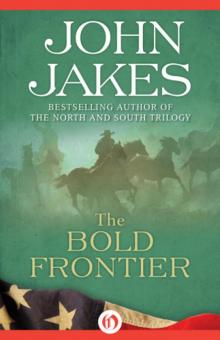 The Bold Frontier
The Bold Frontier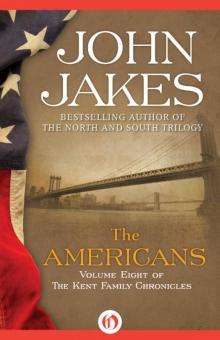 The Americans
The Americans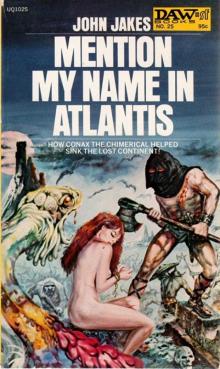 Mention My Name in Atlantis
Mention My Name in Atlantis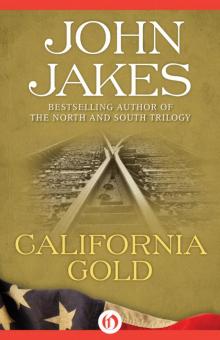 California Gold
California Gold North and South
North and South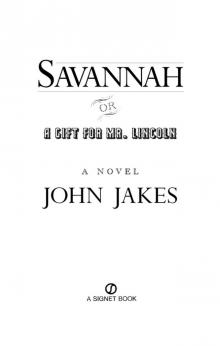 Savannah, or a Gift for Mr. Lincoln
Savannah, or a Gift for Mr. Lincoln Heaven and Hell
Heaven and Hell Homeland
Homeland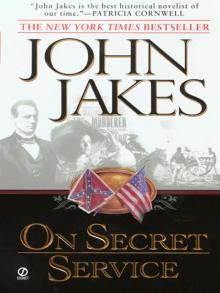 On Secret Service
On Secret Service The Lawless
The Lawless The Titans
The Titans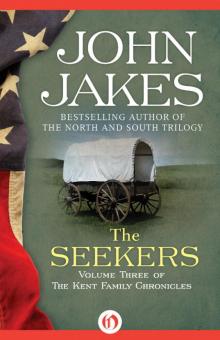 The Seekers
The Seekers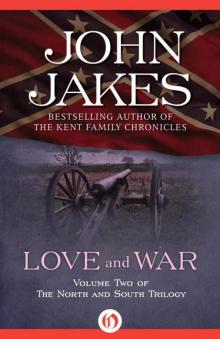 Love and War
Love and War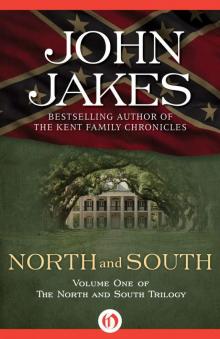 North and South: The North and South Trilogy (Book One)
North and South: The North and South Trilogy (Book One) North and South Trilogy
North and South Trilogy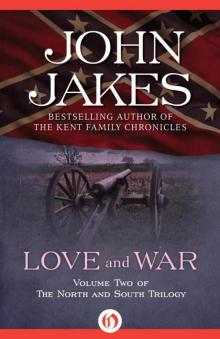 Love and War: The North and South Trilogy
Love and War: The North and South Trilogy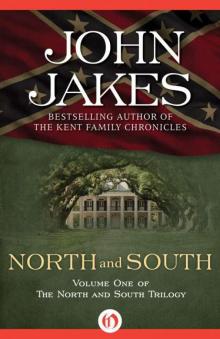 North and South: The North and South Trilogy
North and South: The North and South Trilogy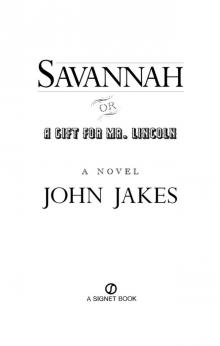 Savannah
Savannah Lawless
Lawless Conquest Of The Planet Of The Apes
Conquest Of The Planet Of The Apes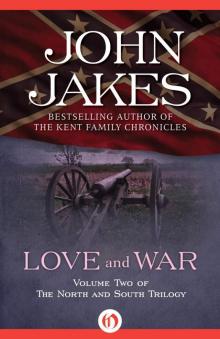 Love and War: The North and South Trilogy (Book Two)
Love and War: The North and South Trilogy (Book Two) The Rebels: The Kent Family Chronicles
The Rebels: The Kent Family Chronicles Heaven and Hell: The North and South Trilogy
Heaven and Hell: The North and South Trilogy Planet of the Apes Omnibus 2
Planet of the Apes Omnibus 2 The Bastard: The Kent Family Chronicles
The Bastard: The Kent Family Chronicles Heaven and Hell: The North and South Trilogy (Book Three)
Heaven and Hell: The North and South Trilogy (Book Three)